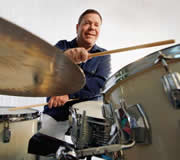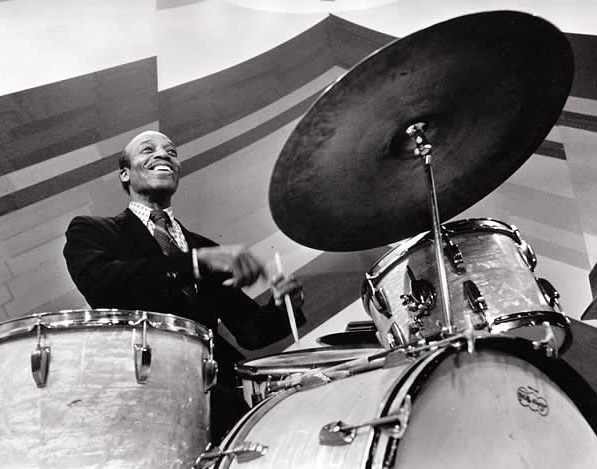Chris Connor: 1927-1981
Chris Connor, last of the triumvirate of the “cool school” of jazz singers that included Anita O’Day and June Christy, died on August 29, at the age of 81, from cancer.
Born Mary Loutsenhizer in Kansas City, MO, Connor studied clarinet for eight years. She first sang publicly–the song was “Amor”– in 1945 at her junior high school graduation.
Three years later, she moved to New York City, hoping to begin a singing career. It only took two months until she joined the “Snowflakes,” the vocal group that was a part of the well-known orchestra led by pianist Claude Thornhill.
She stayed with Thornhill on and off through 1952, then joined the band of Jerry Wald briefly.
In that year, Stan Kenton’s well-known singer, June Christy, announced her attention to leave the band in pursuit of a solo career. Christy had heard Connor singing on a radio broadcast and recommended her to Kenton. She formally joined the band in February of 1953. She stayed a year, constantly touring and recording, and had something of a hit in the form of a song entitled “All About Ronnie.”
Like Christy, Connor left the Kenton band to work as a solo attraction. She moved to New York city in the fall of 1953 and quickly signed a contract with the jazz-oriented, Bethlehem Records. Her first two outings for that label, “Chris Connor Sings Lullabies of Birdland” and “Chris Connor Sings Lullabies for Lovers,” were bestsellers. In 1956 she signed with a bigger label, Atlantic Records, and remained until 1963. Connor was the first, white, female jazz singer to join Atlantic.
Without exception, the productions were superb, and always included the finest jazz players on the scene at the time, from Herbie Mann and Zoot SIms, to Hank Jones and Kenny Burrell. A highlight were two recordings she did in tandem with trumpeter Maynard Ferguson and his orchestra.
Connor’s Atlantic years, many believe, were her finest.
As a singer, Chris Connor was not the inventive, risk-taking scat singer that Anita O’Day was, nor was she the manufactured cool of June Christy. Connor had a wonderfully cool but sometimes smoky, throaty sound. Her singular inventiveness came by way of her sound, the way she toyed, subtly with the melody without ignoring the composer’s intentions, and above all, via her eclectic choice of material. Her time was superb and she knew how to use space. In many ways, she was a minimalist, entirely opposite of the style of Anita O’Day.
She could virtually inhabit everything from a simple pops like “I Miss You So” to the complexity of an “All About Ronnie.” And in 1962, she really took a risk, recording a vocal version of avant-garde saxophonist Ornette Coleman’s “Lonely Woman.”
During the Atlantic years, she performed in nightspots all over the country, and sold out most of them. To the public at large, she was the epitome of the “cool jazz singer.”
She left Atlantic Records in 1963 to join a label called FM, started by her manager, Monte Kay. It was not a wise decision, as the label folded the following year. Her career never really recovered totally, and changing tastes didn’t help.
There was always a following for Connor, however, particularly in Japan.
She recorded for various labels through the years, including ABC / Paramount, Japanese Sony, Progressive Records and Highnote. Her final recording, “Everything I Love,” was released circa 2001.
In the critically acclaimed book, “Jazz In Search of Itself,” writer Larry Kart aptly summed up the aura that was Chris Connor.
Cool, breathy, and almost barren of vibrato, Chris Connor’s voice is a haunted house,” Kart said. “Its tone color alone would be enough to freeze the soul, and the way each phrase seems to be exhaled more than sung only increases the impression that in her music Connor must contend with ghostly powers-either that, or she herself is a spirit summoned unwillingly from beyond.”
Quite a statement. But those fortunate enough to see her and hear her would agree.
Connor made a rare visit to Philadelphia about a half-dozen years ago, and jazz singer Joy Adams and I made sure we were at the club, the now-defunct Zanzibar Blue, as often as possible during her engagement.
She was backed by a very, very modern-sounding group that included long-time pianist Mike Abene and drummer Danny Gottleib. She did wonderful business at the venue, sounded great and was surprisingly contemporary. There was no living in the past for Connor. She wasn’t reprising Kenton or anyone else for that matter. Still, we wanted to hear “Ronnie” and were quite taken aback when she said she wasn’t performing it much these days and didn’t even have the music.
“I do, Joy Adams told her.
“So bring it in tomorrow and I’ll see if I remember it,” Connor answered.
She did. It gave us, and the audience, the chills. Chris Connor’s singing could have that effect.
Of her latter-day work, Connor herself said that she wasn’t taking vocal “chances” as much as she once did.
“I haven’t changed my approach, although my voice has become deeper and softer, and I don’t experiment as much,” she explained several years ago. “When you’re young, you overplay as a musician and you over-sing as a singer because you’re trying all these ideas, and I was throwing in everything but the kitchen sink. I’ve eliminated a lot of things I used to do. The simpler it is, the better it works for me.”
Indeed, it worked. For over 50 years.






